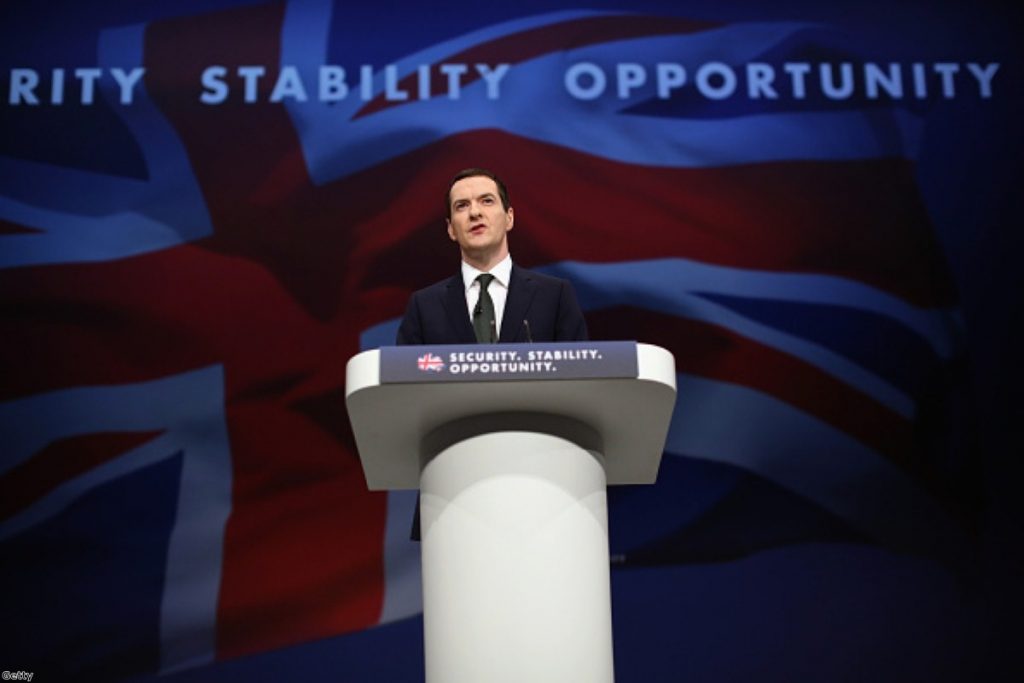George Osborne may tell fairy tales, but at least you know his story
It's easy to forget now, but just three years ago George Osborne's political career looked all but over.
His calamitous management of that year's budget was labeled an "omnishambles" after being forced into a series of humiliating U-turns. By the time he stood in front of a wave of boos in the Olympic stadium, his party's poll ratings had sunk so low that Labour were the hot favourites to form the next government.
Osborne by contrast looked set to be little more than an embarrassing footnote in Conservative political history. The man who had built his reputation as a master tactician, looked all out of ideas and all out of luck.
Yet as Osborne addressed conference today he did so as the overwhelming favourite to not only be the next Conservative party leader, but also the next elected Conservative prime minister. Bookies today reported that they had received more than a hundred times as much money on Osborne as they had received on his nearest rival Boris Johnson since May.


The reasons for that incredible political resurrection were all evident in his speech in Manchester today.
In recent years Osborne has mastered the art of political message discipline. The main reason for the his success has been to find one simple argument and to repeat it to the point of tedium. In the run up to the last general election, Osborne encouraged ministers to use the phrase 'long term economic plan' in almost every statement they made. When Tory MPs stood up in the House of Commons, there was always an audible groan from the opposition as the inevitable use of the phrase materialised.
But while Osborne's mantric use of the phrase may have been ridiculed at the time, in hindsight it was brilliantly effective. As a result of this rigid message discipline, the Tory claim that only they could be trusted long-term with the economy was drilled into millions of voters' minds. The public may not have known what Osborne's long-term economic plan actually was, but they sure as hell knew that he had one.
Now that election has been won, Osborne has moved onto another simple mantra. Seven times in his speech today, the chancellor used the phrase "we are the builders", combined with the claim that Labour want to "stand on the sidelines" and "knock things down". If you missed the point the first time, you sure as hell would't have missed it the seventh time.
And it wasn't just rhetoric. Osborne also had policy to back it up. First he announced that there will be a new infrastructure commission headed by Labour's Lord Adonis which will be handed billions in new funding. Secondly he announced plans to devolve powers over business rates to local people. Like the infrastructure commission and the living wage, this was originally a Labour policy. And like those other two policies it is the Tories who are now implementing them in government, while Labour (Adonis aside) can only stand on the sidelines and try to knock it down.
This message that the Tories are the builders, while Labour are the wreckers is likely to be featured heavily in all the coverage of his speech. Asno doubt will the footage of Osborne's placard-waving opponents, quite literally shouting from the sidelines outside conference.
Again you may not agree with Osborne's message. You may say that the Tories are the ones who have knocked things down in government, while Labour stand in front of the wrecking ball. You may think it's Osborne who has stood on the sidelines while inequality has soared and the housing crisis has deepened. You may think it is Labour who are offering to build Britain up, while the Tories offer nothing but further cuts which knock it down. But agree with his message or not, by the time voters go to the polls, most will know basically what it is.
But while this rigid political and rhetorical discipline has made Osborne the most successful Westminster politician of recent years, his position there is not inviolate.
The biggest risk for Osborne is that he often has the manner of a man who believes himself to be invincible. That level of confidence, bordering on arrogance, has tripped him up before and could well do so again. The growing political row over Osborne's planned cuts to tax credits has the potential to damage both him and his party if he doesn't make at least a partial retreat.
It was also telling that the reception he received from activists to his speech today was hardly overwhelming. His closest rival, Boris Johnson, is likely to receive a far warmer welcome when he stands up to speak tomorrow.
Sufficient numbers of voters may respect him, while his opponents may fear him, but there are few in Britain today who love him. In an era where anti-politics is on the rise, Osborne's smooth calculating style may ultimately prevent him from getting the top job.
But despite this, the key to winning in modern politics is to write a clear story, then tell it to anyone who will listen. Osborne knows this and has spent years convincing the public of his story. So far his opponents, both inside and outside the party, have ot even got theirs onto the page.









